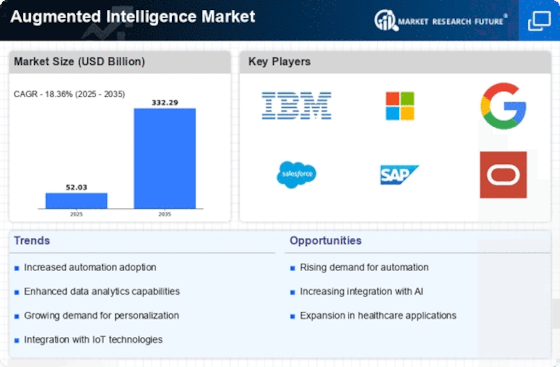Augmented Intelligence Size
Augmented Intelligence Market Growth Projections and Opportunities
The constantly changing Augmented Intelligence market is affected by many factors. These factors determine its growth and direction. The need for better decision-making skills in all fields is driving the market. Businesses are beginning to recognize how valuable it is to employ artificial intelligence to manage vast volumes of data and gain insights that they can use. Analysts require more powerful tools as data sets get more complex, driving this need. Technology shapes the augmented intelligence market. As machine learning, natural language processing, and computer vision improve, AI solutions become more powerful and valuable. The never-ending hunt for breakthroughs in these areas not only increases the capacities of augmented intelligence, but it also makes market competitors fight to be the first to come up with new ideas. The expansion of "big data" is another key market problem that influences the usage of "augmented intelligence." Today's digital era produces a tremendous quantity of data that changes fast and in many various sorts. Smart systems are needed to analyze this data and extract meaningful information. Augmented intelligence is like a force booster because it helps individuals make choices by helping them analyze intricate data patterns, identify concealed trends, and forecast what will happen in the future. Regulations also shape the augmented intelligence business. Governments and regulatory organizations are working hard to ensure fair and responsible use of AI as technology is employed increasingly in various sectors. For augmented intelligence to flourish in a manner that lasts, it's crucial to strike the proper combination between fostering new ideas and keeping people safe from any threats. Another major market aspect that fosters growth in artificial intelligence is the degree of competition. Having a number of participants, from well-known IT businesses to fledgling startups, produces an atmosphere that stimulates fresh ideas and uniqueness. Companies constantly brainstorm new concepts. This has led to widespread use in healthcare, banking, manufacturing, and more. A lot of what influences the Augmented Intelligence industry is also impacted by the economy. More organizations are discovering that artificial intelligence may save them money by improving efficiency, cutting expenses, and increasing productivity. Businesses are willing to invest in and deploy AI technology if they can profit economically. Also, consider how higher intelligence would effect society. As AI gadgets expand, more people require new abilities to use them. Social implications including job loss and AI morality have prompted discussions and appropriate solutions. How companies collaborate and form relationships affects the AI market. Strategic alliances let companies collaborate, exchange resources, and develop new goods and services faster. These relationships help us better understand the artificial intelligence market's myriad challenges and opportunities.



















Leave a Comment